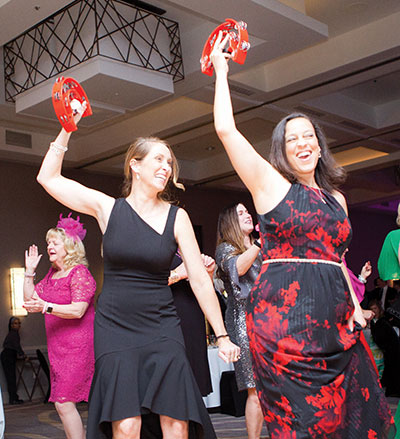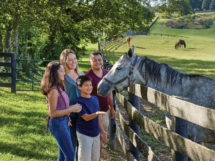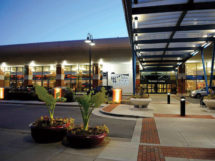NONPROFITS

If you look up Title 26 of the United States Code, the Internal Revenue Code, under subtitle A, chapter 1, subchapter F, part I, section 501 (out of almost 10,000), you’ll find even more lettered sections and numbered subsections. Suffice to say, being approved for a 501(c)(3) with tax-exempt status by the IRS is a big deal.
Not all nonprofits have applied for this IRS designation, which makes donations tax-deductible, or filed articles of incorporation, but whether a charitable organization is as well-known as the American Heart Association or as small as a neighborhood food drive, they all exist to help those in need. It feels good to help others and contribute to the societal health of the community. Offering support by way of financial donations or sitting on a board of directors, participating in committee discussions, attending networking events and fundraising galas—nonprofit organizations are woven into the fabric of business, community and humanity.
Greater Louisville is rich with ways to get involved in making the region a better place for all.
The Center for Nonprofit Excellence was established in 1999 as a central source for nonprofits in the region. CNPE shares resources, information and best practices within its membership of more than 500 groups and individuals. Its sole focus is on elevating the nonprofit community.
Metro United Way represents more than 100 community agencies whose programs serve Jefferson, Bullitt, Shelby and Oldham counties in Kentucky, along with Clark, Floyd and Harrison counties in Indiana. Formed in 1917 as the Louisville Federation of Social Agencies, it was later called Louisville Community Chest before being named Metro United Way in 1972. The organization has raised more than $1 billion for Kentuckiana. United Way is a strong proponent of the decennial census, as government grants are distributed for a decade based on one year’s data.
 The Louisville Independent Business Alliance was formed in 2005 as a nonprofit to promote locally owned businesses and preserve the unique community character of the Metro Louisville area. The annual Buy Local Fair, Louisville Local Business Expo and expressions like “Buy Local First” and “Keep Louisville Weird” are a few of the ways LIBA supports local entrepreneurs and educates citizens on the value of buying locally.
The Louisville Independent Business Alliance was formed in 2005 as a nonprofit to promote locally owned businesses and preserve the unique community character of the Metro Louisville area. The annual Buy Local Fair, Louisville Local Business Expo and expressions like “Buy Local First” and “Keep Louisville Weird” are a few of the ways LIBA supports local entrepreneurs and educates citizens on the value of buying locally.
Celebrating its 50th anniversary in 2020, Cedar Lake honored its date of incorporation on Feb. 24 with a staff celebration. Founded in 1970 by Louisville-area parents of people with intellectual disabilities, Cedar Lake’s current operating budget is in excess of $30 million. The nonprofit employs nearly 500 staff members, supports more than 250 people with intellectual and developmental disabilities; maintains 36 properties across Jefferson, Oldham and Henry counties; and offers community services such as outpatient therapy, case management and in-home support, among many others.
Caroline Johnson founded Twisted Pink in 2014. The Louisville-based nonprofit funds research for metastatic breast cancer and supports education and advocacy that will result in better outcomes for those living with a stage IV breast cancer diagnosis. In addition to formal galas and other traditional types of fundraising, the organization uses Facebook’s fundraising tool so that individuals can conduct online fundraisers for a specific time period, sharing their support and reason for giving to Twisted Pink.
Headquartered in Louisville, the nonprofit WaterStep developed a piece of equipment in 2014 to combat the Ebola outbreak; it has proved critical in the fight against COVID-19. Their patented BleachMaker is a portable device powered by water and table salt. When plugged into an electric source it can generate a gallon of concentrated bleach in an hour, producing a disinfectant strong enough to sanitize medical clinics, kitchens, surfaces and clothing – for locations in developing nations and for more than 70 social services agencies and homeless shelters in Louisville and southern Indiana. Funded by the Louisville Water Foundation, UPS and GE, the BleachMaker was designed by a group of engineers from the University of Louisville, the Louisville Water Co. and General Electric’s FirstBuild Innovation Center.
WaterStep also trains people in developing countries how to use safe water solutions – water chlorination, bleach making, health education and well repair – and empowers communities to take care of their own water needs for years.
Formerly known as Supplies Over Seas, SOS is another global organization based in Louisville, partnering with hospitals to send surplus medical supplies and equipment to medically impoverished communities worldwide instead of to landfills – more than three million pounds since 1993. SOS is one of seven such accredited organizations in the country. The surplus is redistributed locally also, helping assisted-living facilities and nursing homes in Kentuckiana during the 2020 pandemic.
In early March, Mayor Greg Fischer launched the Lift Up Lou movement to maintain a sense of connectedness during social distancing. He commissioned a city song, “Lift Up Louisville,” which debuted April 27 thanks to the collaborative effort by Louisville Orchestra’s music director Teddy Abrams, cellist/composer Ben Sollee, Scott Carney of Wax Fang, singer/songwriter Will Oldham, Jim James and Patrick Hallahan of the band My Morning Jacket, percussionist Dani Markham, hip-hop star Jecorey “1200” Arthur, gospel singer Jason Clayborn, singer Carly Johnson and another 20 artists. A music video of the song was produced by Kertis Creative and directed by Stephen Kertis. Marketed nationally and available via sonaBLAST! Records, a local independent label, all proceeds from “Lift Up Louisville” benefitted the One Louisville: COVID-19 Response Fund, a nonprofit formed as a central source to provide emergency resources for those working the frontlines during the pandemic. The mayor described the project as “a love song to my hometown.”
The Bufford Family Foundation donated $50,000 to the One Louisville: COVID-19 Response Fund. In honor of the foundation’s motto, “Helping others is always the right thing to do,” Susan and Randy Bufford also donated $50,000 to Louisville Metro Government to deliver meals to 500 homebound seniors. Administered by Louisville Metro Office of Resilience and Community Services, the food was prepared by Masterson’s Catering.
In mid-March, Metro Council voted to establish a $2.7 million emergency assistance package, the Louisville Metro Council COVID-19 Relief Fund. The first round of funding assisted seven nonprofit relief organizations that help citizens with housing and food support: Central Louisville Community Ministries, Eastern Area Community Ministries, Fern Creek/Highview United Ministries, Jeffersontown Area Ministries, New Directions Housing Corporation, South Louisville Community Ministries and West Louisville Community Ministries.
Give For Good Louisville is a 24-hour online fundraiser for 501(c)(3) public charities within the eight-county area of Louisville. The 2019 event raised almost $7 million for 500 local nonprofits. The 2020 online fundraiser is Thursday, Sept. 17. Give For Good Louisville is hosted by the Community Foundation of Louisville, founded in 1984 and the largest foundation of its kind in the state. It connects donors, nonprofits and civic partners, and has more than $600 million in assets and more than 1,800 charitable funds.




















Add Comment